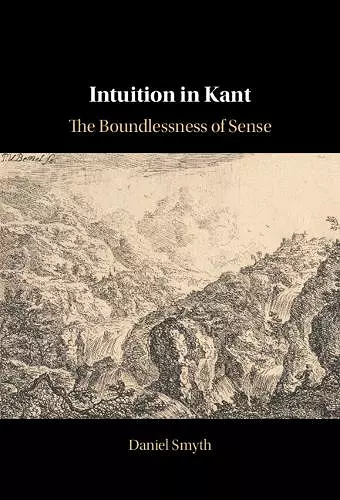Intuition in Kant
The Boundlessness of Sense
Format:Hardback
Publisher:Cambridge University Press
Published:14th Mar '24
£85.00
Supplier delay - available to order, but may take longer than usual.

This book reconstructs Kant's conception of intuition and its role in his philosophy of mind, epistemology, and philosophy of mathematics.
This is the first monograph on Kant's theory of intuition to appear in several decades. It will appeal to scholars of Kant, Early Modern Philosophy, German Idealism and Romanticism, as well as those with a general interest in the theory of knowledge.In this book Daniel Smyth offers a comprehensive overview of Immanuel Kant's conception of intuition in all its species – divine, receptive, sensible, and human. Kant considers sense perception a paradigm of intuition, yet claims that we can represent infinities in intuition, despite the finitude of sense perception. Smyth examines this heterodox combination of commitments and argues that the various features Kant ascribes to intuition are meant to remedy specific cognitive shortcomings that arise from the discursivity of our intellect Intuition acting as the intellect's cognitive partner to make knowledge possible. He reconstructs Kant's conception of intuition and its role in his philosophy of mind, epistemology, and philosophy of mathematics, and shows that Kant's conception of sensibility is as innovative and revolutionary as his much-debated theory of the understanding.
'This highly engaging book offers a convincing and original interpretation of what it dubs 'Kant's apperceptive approach to the cognitive faculties,' revealing among other things its surprising implications for the nature of sensibility and intuition. Ranging over Kant's methodology, philosophy of mind, logic, epistemology, and philosophy of mathematics, Smyth brings fresh light to a number of key ideas and distinctions in Kant's mature theoretical philosophy.' James Messina, University of Wisconsin-Madison
'As far as I can say, there is no comparable book on Kant that has ever investigated Kant's conception of the senses in the way in which it is investigated here, namely as a capacity for cognition, as it is known through self-consciousness. I think this perspective on the senses is really fascinating and makes an important - and certainly provocative - contribution to our understanding of ourselves as sensible beings. I highly recommend the book.' Andrea Kern, Professor Philosophy, University of Leipzig
ISBN: 9781009330312
Dimensions: 235mm x 158mm x 21mm
Weight: 550g
274 pages